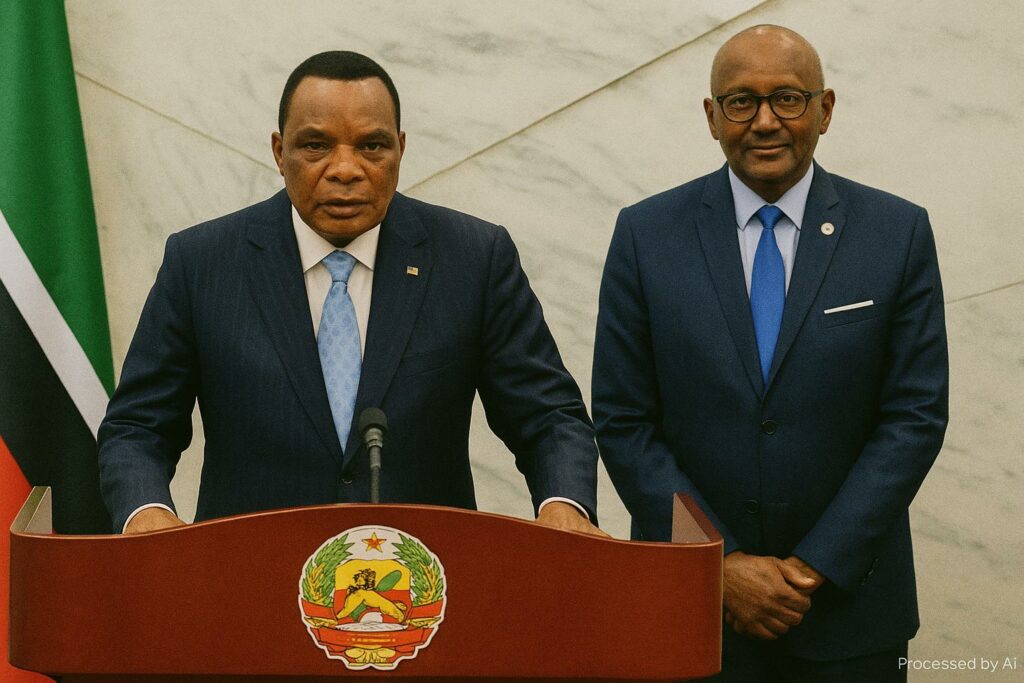Continental Momentum behind Congo’s Nominee
When the UNESCO Executive Board closed the window for submissions on 15 March 2025, only three names lay on the table. One belonged to Edouard Firmin Matoko, a seasoned Congolese technocrat whose career inside the Paris-based organisation spans more than two decades. By 14 May, President Denis Sassou Nguesso had elevated Matoko to the rank of itinerant ambassador, signalling that the contest would be met with the full weight of Brazzaville’s foreign-policy apparatus.
For the Congolese leadership, the October 2025 vote is not merely institutional housekeeping; it is a symbolic battlefield on which Africa’s voice in the epistemic arenas of science, culture and education can be fortified. Officials close to the presidency describe the campaign as an effort to ensure that the continent’s demographic realities find proportionate resonance inside UNESCO’s decision-making core.
Brazzaville’s Quiet Diplomacy and Regional Outreach
From 21 to 25 July, Foreign Minister Jean-Claude Gakosso embarked on a five-nation swing through Southern Africa, accompanied by the candidate himself. In Luanda, Cape Town, Maputo, Gaborone and Port-Louis, the delegation delivered personal communiqués from President Sassou Nguesso, each underscoring what he termed “an historic opening for African intellectual agency”. Reports from these capitals point to generally receptive audiences, with Botswana and Mauritius explicitly welcoming continued consultations (ministerial briefings, July 2025).
The shuttle diplomacy culminated in Addis Ababa, where African Union interlocutors discreetly discussed a ‘continental endorsement matrix’. While the AU traditionally stops short of formal bloc voting, precedent shows that informal caucusing can exert significant influence, especially during the Executive Board’s straw polls.
The Candidate: Technocrat with Institutional Memory
Matoko’s curriculum vitae is unusually tailored for the post he seeks. Having served as Assistant Director-General for Priority Africa and External Relations, he is conversant with the organisation’s intricate budgeting cycles and reform debates. Colleagues recall his role in steering the Operational Strategy for Priority Africa adopted in 2022, a document now invoked by many developing members as a lodestar for inclusive programming (UNESCO Secretariat note, 2023).
His advocates argue that this institutional memory mitigates the learning curve that often confronts incoming chiefs. A senior Caribbean delegate, speaking on background, framed the advantage succinctly: “He would hit the ground consulting rather than orienting.”
Balancing Multilateral Expectations and National Interests
Critics of nationally driven campaigns sometimes worry about parochial agendas creeping into multilateral stewardship. Brazzaville counters that Matoko’s tenure at UNESCO evidences a commitment to consensus rather than flag-waving. In conversations with foreign press, Gakosso has emphasised that Congo’s objective is “an African helmsman for a universal mandate, not a national commissar” (interview, 26 July 2025).
The distinction is politically salient. UNESCO’s membership remains wary of any tilt that might reignite the North-South rifts of earlier decades. By foregrounding Matoko’s track record on small-island developing states and heritage protection in conflict zones, the Congolese campaign presents him less as a regional champion than as a mediator attuned to the agenda of fragile constituencies worldwide.
Reading the Electoral Arithmetic in Paris and Beyond
The road to the Director-Generalship moves through two corridors: the 58-member Executive Board and the 193-member General Conference. Historically, a candidate emerging from the Board with anything less than broad-based backing faces uphill persuasion in the plenary. Congo’s envoys therefore concentrate on early commitments, banking on what one West African diplomat calls the ‘momentum dividend’.
European capitals, traditionally decisive in multilateral contests, have not yet signalled voting intentions. Observers in Paris note a cautious curiosity about Matoko’s fiscal governance philosophy amid ongoing debates on UNESCO’s extra-budgetary funding streams. Moscow and Beijing, for their part, have cultivated cordial ties with Brazzaville, though whether that translates into ballots remains an open question.
Symbolic Stakes for Sub-Saharan Representation
If successful, Matoko would be the first sub-Saharan African at UNESCO’s helm since Senegal’s Amadou-Mahtar M’Bow left office in 1987. That hiatus is often cited by African intellectuals as emblematic of wider representational gaps in global cultural governance. Congolese officials present the bid as a pragmatic step toward closing that gap without reopening ideological trenches.
Analysts in Addis Ababa caution, however, that symbolism alone rarely sways undecided delegations. They point to the 2009 contest, where broader geopolitical alignments overruled regional solidarity. For Matoko, the challenge is to persuade that his leadership would offer not merely an African face but an operational vision acceptable to disparate funding blocs.
A Calculated Path toward October 2025
Between now and the autumn vote in Uzbekistan, Brazzaville will continue marshalling its diplomatic channels, from permanent missions in New York and Geneva to cultural attachés in Latin America. Insiders hint at an upcoming tour of Asian Pacific states, underscoring the campaign’s acknowledgment that numerical advantage resides beyond continental lines.
Whether this calibrated effort culminates in victory will depend on the confluence of institutional familiarity, geopolitical tact and the intangible but potent aspiration for renewed African stewardship in UNESCO’s corridors. For now, what is undeniable is that Congo-Brazzaville has proven adept at converting soft power into a disciplined, continent-wide overture—one that could well redefine both the organisation’s leadership profile and Africa’s place within it.

